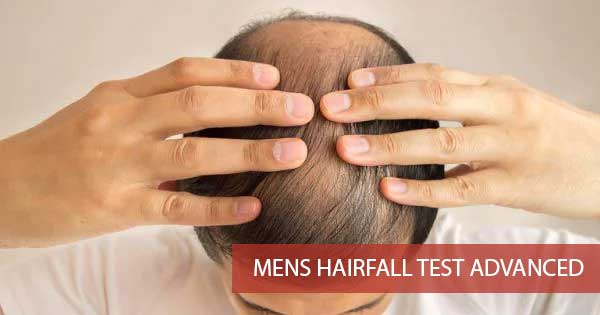
Our hair fall packages detect Thyroid Disorders, Vitamin Deficiencies, Iron Deficiencies, Arthritis Issues, Renal Problems, Metabolic Disorders, Infertility & Hormonal Imbalances.


Our hair fall packages detect Thyroid Disorders, Vitamin Deficiencies, Iron Deficiencies, Arthritis Issues, Renal Problems, Metabolic Disorders, Infections, Infertility & Hormonal Imbalances.

Regardless of gender, we all suffer from hair loss. We all experience hair loss from time to time which is quite normal, but extreme hair loss or hair thinning may indicate an underlying health condition.
What actually is hair loss?
Hair loss is a disease which equally affects both men and women. Certain lifestyle factors and bodily changes may cause hair loss in women. Besides, in the case of men, hair fall may occur due to heredity.
What are the types of hair loss?
There are mainly two types of hair loss, such as:
What are the causes of hair loss?
There are a bunch of diagnostic tests available, which will help you to find out the main reasons for the hair loss. In many aspects, hair fall is also considered as a symptom of other diseases, which is why it is important to have a knowledge of what is causing you this hair fall.
What is a hair fall profile test?
As we know blood tests give us the exact information regarding our health. Likewise, a hair fall profile test will help you to determine the exact potential reason for your excessive hair fall or hair loss.
You can opt for the thyrocare hair fall profile, they offer distinctive hair fall screening for both men and women. The hair fall profile price is very minimal in comparison to the 43 to 47 tests this profile includes. All these tests will analyze your hair thoroughly. The profile test includes:
All these tests are included in the profile test to analyze your hair more precisely.
What you may expect during the thyrocare Hair fall profile?
Thyrocare offers free home sample collection, therefore, a well-trained phlebotomist will come according to the booked slot time and will collect the specimen. The phlebotomist will insert a thin needle into a vein in your hand to collect the fluid. After collecting the small quantity of blood, he or she will transfer it into a container and will send it to the laboratory for clinical testing. You can expect the test report within 72 hours of sample collection.
What preparations do you need?
You are required to fast for about 8 to 12 hours before the test. Apart from that, you do not need any other test preparations.
Is there any risk of taking this test?
The simple answer is there is absolutely no risk of going for the test. You may experience a slight bruising at the side of the injected area, but the pain and bruising will heal on its own within a day or two.
How to interpret the test report?
All the reference ranges of the tested levels are mentioned in the test report. However, just keep in mind that the reference ranges slightly differ from laboratory to laboratory. Therefore, before going to any conclusion, it is advisable to contact your doctor for a better understanding of the test report.